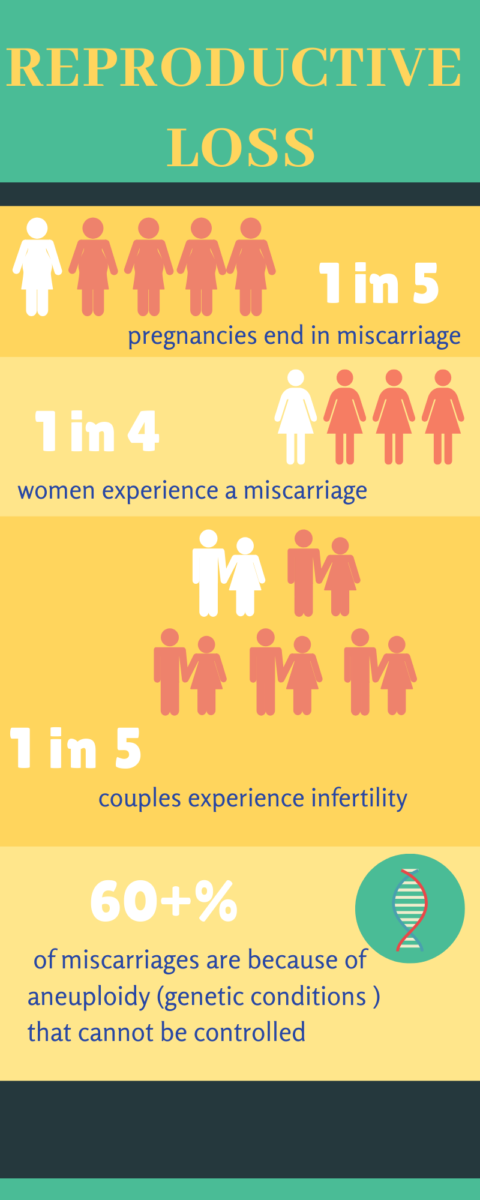 1 in 4 pregnancies ends in miscarriage. 1 in 5 couples experience infertility or struggle to become pregnant. Reproductive loss, including miscarriage and infertility, impact a large portion of our population, and yet there is stigma around discussing infertility and miscarriage.
1 in 4 pregnancies ends in miscarriage. 1 in 5 couples experience infertility or struggle to become pregnant. Reproductive loss, including miscarriage and infertility, impact a large portion of our population, and yet there is stigma around discussing infertility and miscarriage.
Approximately 20% of church goers are experiencing or have experienced reproductive loss. Unfortunately, the church has often failed to include and support those who experience reproductive loss. But, the church (and the greater world!) can learn to care for and nurture those in the midst of loss, and can create a culture that breaks the silence of reproductive loss.
There are tangible and simple ways the church can embrace those experiencing reproductive loss which are discussed below in move detail, and a few others which I only mention here.
- Pray for those experiencing reproductive loss in your own prayers and openly in the prayers of the people or pastoral prayer.
- Stop Mother’s and Father’s Day celebrations that isolate and hurt those who have lost pregnancies or cannot bear a child.
- Share the stories of women from the Bible and from community. Always do this with permission and if you are speaking from your own experience do so from scars not open wounds.
- Offer services of remembrance like a Longest Night service or memorial service after a miscarriage.
- Open space for people to share their stories.
- Never say things like “it was God’s plan” “God needed another angel” “You can always try again”. These are not helpful. Instead offer words like “I’m so sorry” “What is your favorite cookie/wine/coffee and then deliver it” Share the story of God who is present in the midst of their grief and sit alongside of them too.
First the church can talk about women.
Yes, that basic. Talk about women’s lives, experiences, and bodies. There is discomfort discussing a woman’s body, and the monthly cycle of bleeding. Perhaps this discomfort comes from an eons old habit of finding the bleeding woman’s body unclean,[i] and perhaps it is because of a lack of education about women’s bodies. This inability to discuss the basics of the body and a woman’s experience inevitably renders women silent about reproductive loss.
One way we can help to change the way bleeding bodies and human bodies in general are understood is to offer education. This can start with our children and youth. There are wonderful Christian moderate-progressive resources on the human body that can be used to break this barrier[ii].
Second, we can tell the stories of women found in the scriptures.
Tell and preach the stories of the Matriarchs – Sarah, Rebekah, Leah, and Rachel, of their struggle to bear a child, and the ways God was present with them throughout it all. We also need to acknowledge that not all stories of infertility end in the birth of a healthy child. However, there are many stories about loss and where to find God and community in the midst of loss.
There are other stories of loss throughout the scripture that the church has traditionally pointed women to in times of grief over desired children: the matriarchs, Hannah the mother of Samuel, various lament psalms, Mary the mother of Jesus, the bleeding woman in the Synoptic Gospels,[iii] the female personification of Israel, and Tabitha We can relate to these stories of loss, hopelessness, and feeling like the body has rebelled against itself.
Third, we need to be people who hold their faith and offer prayers.
In a survey of 50 women many said in the midst of grieving a miscarriage or long-term infertility prayers said when they did not have the strength to pray to God, the prayers of others were a great comfort[iv]. Others said they needed someone to hold faith in God for them while they were in the midst of grief. We can offer prayers, offer prayers written by others, and use the lament Psalms.
We need to change the way we hold worship services that center around parenthood/babies/children and Advent.
If 20% of your congregation has experienced reproductive loss (which statistics say are likely) then asking folks to stand up on Mother’s and Father’s Day if they are parents can be incredibly triggering. For those experiencing infertility, for those who have lost a pregnancy, it is a season of constant reminders that they are childless, or that their desired child was gone. The flowers and cards and special prayers of Mother’s and Father’s Days become days that represent what never could be, what has been lost, or what they cannot become. If you must do something on those days raise money for a children’s home/foster care system, and pray for all men and women who are all the beloved children of God.
Advent and Christmas are especially hard for those who experience reproductive loss. Nearly every song, story, and decoration remind us of the birth of a miracle baby (Jesus and John!) Be especially sensitive during this time. Perhaps you can offer a service of remembrance for those who have lost pregnancies and children. In 2019 my local congregation, St James United Methodist Church Atlanta, had several deaths of adult children whose parents were still living, and I knew of at least 4 miscarriages that same year. The church is centered in the Buckhead/Brookhaven area of Atlanta and near several hospitals and fertility clinics. The community desired a service to mourn and remember what could have been and what was lost. We offered a Longest Night, or Blue Christmas, service which we called “Pregnancy and Child Loss Service of Remembrance.” You can find some liturgies online or feel free to use the service liturgy at the end of this post.
Offer other acts of remembrance for those experiencing reproductive loss.
Even put those offerings on your website with your wedding and funeral information so it is visable! A service of remembrance for an unborn child, a service to say good bye to the hopes and dreams of children can all happen simply. A church could offer an area on grounds where people can make a memorial to a miscarried child, or even a place to bury the remnants of the pregnancy. These services can be very simple in a chapel or outdoors where the parents and minister can pray, read scripture, light a candle, and say goodbye.
It is important to acknowledge loss. There is no need to forget reproductive loss, or to move on with life as though the loss never happened. God does not cause our suffering, God grieves the loss of desired children and the loss of hope for children. God also remembers our losses.
There is peace in knowing that God remembers our lost children. Isaiah 49:15 says, “Can a woman forget her nursing child, or show no compassion for the child in her womb? Even these may forget, yet I will not forget you.”
Finally,
One of the most important things the church can do is to break the silence around reproductive loss, through the acts discussed above, and by being open it about it ourselves. Reproductive loss is felt across all ages, races and ethnicities, socio-economic statuses,[v] and education levels. Once a family begins to open up about their loss or about their fertility journey it is almost as though one is welcomed into a secret group. The number of people who have lost pregnancies, been labeled infertile, or have undergone IVF or similar treatment is around 25 percent of women. So, 1 in 4 women are part of this “secret group.” In my experience once you start talking about reproductive loss openly (and with empathy and care) the walls women have put up around their experience begin to break down.
Create space for story sharing where woman (and men) can find comfort in sharing their experiences.
Often this happens because one person shares their story and others feel comfortable sharing their own because there is a safe place where others understand what they have been through.
One author, Monica A Coleman wrote, “If women wrote the Bible, it might mention how messy the enterprise of not-having-children really is. It might mention the girl children the women loved. It might talk about how the men were in the temple, while the bleeding women gathered somewhere else. If women wrote the Bible, we would have more than these solitary scenes where a woman pours out her heart to God, and God fixes it by ‘opening her womb.’ If this woman wrote the Bible, I’d write about barren women… and the women who support them. These stories would be my love letter to them.”[vi]
The church has an important place in people’s lives. It is where people come for major life events like their own baptism, marriage, the baptism of their children, and to say goodbye to loved one at funerals. The church should be a place where comfort and hope can be found for all their life events, including reproductive loss. Nearly 20% of couples currently face reproductive loss, that is 1 in 5 couples, that the church regularly encounters, both within the walls of the building and in the world around the church.
By speaking openly about our own personal journey, once it is a scar and not an open wound, and pointing to places within the scripture where God and others feel the sting of loss, we can begin to break the silence and offer safe spaces for people to grieve and find a God of love who did not cause their desired child. We need to share stories, offer prayers, embrace those who are grieving, and offer the endless love of God.
Resources for those experiencing reproductive loss:
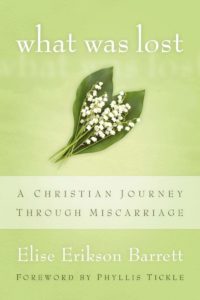 Barrett, Elise Erikson. What Was Lost: A Christian Journey through Miscarriage. Louisville, Ky: Westminster John Knox Press, 2010. Elise Erikson Barrett’s “What was Lost: A Christian Journey Through Miscarriage,” is a wonderful resource for those who are experiencing reproductive loss, as well as for those walking alongside of loved ones who are experiencing such things. It is clearly written and offers discussion questions and some very tangible steps to take through the grieving process.
Barrett, Elise Erikson. What Was Lost: A Christian Journey through Miscarriage. Louisville, Ky: Westminster John Knox Press, 2010. Elise Erikson Barrett’s “What was Lost: A Christian Journey Through Miscarriage,” is a wonderful resource for those who are experiencing reproductive loss, as well as for those walking alongside of loved ones who are experiencing such things. It is clearly written and offers discussion questions and some very tangible steps to take through the grieving process. Or Infant Loss. Abingdon Press, 2019. This little book is a very practical guide for a family after a miscarriage or the death of an infant. It talks about grief, depression, and the love of God in the midst of it. The second half of the book contains a daily scripture reading and meditation.
Or Infant Loss. Abingdon Press, 2019. This little book is a very practical guide for a family after a miscarriage or the death of an infant. It talks about grief, depression, and the love of God in the midst of it. The second half of the book contains a daily scripture reading and meditation.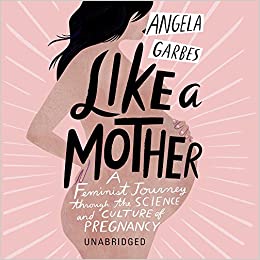 Garbes, Angela. Like a Mother: A Feminist Journy through the Science and Culture of Pregnancy. New York: Harper Wave, 2018. This book is not something I would suggest unless a woman wants to know more about the science of pregnancy and loss. This was an extremely helpful book for starting conversations around what is happening in a body and how to understand the physical symptoms of pregnancy loss.
Garbes, Angela. Like a Mother: A Feminist Journy through the Science and Culture of Pregnancy. New York: Harper Wave, 2018. This book is not something I would suggest unless a woman wants to know more about the science of pregnancy and loss. This was an extremely helpful book for starting conversations around what is happening in a body and how to understand the physical symptoms of pregnancy loss.
Longest Night Service of Remembrance
Service held at St James United Methodist Church December 18, 2019
Many in this season are ready to sing “Joy to the World.” Whether this is the first Christmas without someone we love, or we are still hurting from loss or suffering for a long time, we gather this evening as darkness comes to worship God in the midst of mourning. We gather to shed tears if they come, to hold hands if they are available, and to join our voices with one another and our forebears in the faith who still cry out, “How long?”
And so, we pray:
Come, Holy Spirit.
Comfort us and all who mourn this night.
Give us strength to grieve as we must.
Help us receive your healing in the midst of our pain,
and find new order after the chaos of loss;
through Jesus Christ, our Lord. Amen.
Welcome
We are gathered here in the presence of God to offer our grief and seek healing for all of the losses and griefs that surround us: loss of comfort or relationship, loss of jobs and security, grief over hard diagnosis, loneliness, the loss of a loved one.
During this season of Advent and Christmas we acknowledge that the loss of a child is even more excruciating than usual. And we grieve.
Some of us grieve the inability to conceive. Some of us grieve the loss of a pregnancy—whether through miscarriage, or other complications. Some of us grieve stillborn children and precious infants who died at birth. Some of us know the deep and helpless pain of watching our children die. Some of us know the deep sadness and grief of having our children die at the hands of another.
We worship together, knowing that God is full of compassion and mercy, ready to hear when we pray, to comfort when we mourn, to help us bear our grief and sorrow, and to quiet our anxiety. The steadfast love of our God never ceases.
Let us join our hearts and voices together as we enter this sacred space of grief and hope and healing[1].
Hymn O Little Town of Bethlehem
Sung by all, standing
Words of Grace[2]
Thus, says the Lord:
A voice is heard in Ramah, lamentation and bitter weeping.
Rachel is weeping for her children; she refused to be comforted for her children, because they are no more. (Jer 31:15)
Blessed be the God who consoles us in all our affliction, so that we may be able to console those who are in any affliction with the consolation with which we ourselves are consoled. (2 Cor. 1:3a,4)
In the beginning was the Word, and the Word was with God, and the Word was God.
All things were made by God, and without God nothing came to be.
What came to be through God was life, and this life was the light of the world.
The Light shines in the darkness, and the darkness has not overcome it.
The First Reading: Psalm 139
A Reading from the book of Isaiah (40:1, 25-31)
Leader: The Word of the Lord.
People: Thanks be to God.
Hymn: Come and Fill Our Hearts (Taize)
Litany of Remembrance
(The first candle is lighted.)
Officiant: We light this first candle to remember those whom we have loved and lost.
We pause to remember clearly, their faces, their voices, their bodies.
We embrace and give thanks for the memories that bind them to us in this season of expectation,
when all Creation waits for the Light.
O come, O come, Emmanuel, and ransom captive Israel
That mourns in lonely exile here, until the son of God appears
Rejoice, rejoice, Emmanuel shall come to thee, 0 Israel.
A period of silent reflection
The second candle is lighted.
Officiant: We light this second candle to remember the pain of loss:
the loss of relationships, the loss of much desired pregnancies and children, the loss of jobs with the security they bring, the loss of health in ourselves or in family members, the loss of joy and peace in our lives from the stresses which surround us, the loss and loneliness we experience when our loved ones do not share our faith. As we gather up the pain of the past we offer it to you, 0 God, asking that into our open hands you will place the gift of peace.
O come thou Wisdom from on high, who orderest all things mightily
To us the path of knowledge show, and teach us in her ways to go
Rejoice, rejoice, Emmanuel shall come to thee, 0 Israel.
A period of silent reflection
The third candle is lighted.
Officiant: We light this third candle to remember ourselves this Christmas time.
We pause and remember the past weeks, months, and for some of us years, that have been heavy with our burdens. We accept and lay before you, God, the sharpness of memory, the sadness and grief, the hurt and fear, the anger and pain. We accept and lay before you the ways we feel we have fallen short, and the times we have spent blaming ourselves, and you,
for all that we have suffered. We accept and lay before you the time we have walked alone, in darkness; and in knowledge of our own mortality.
O come thou day-spring, come and cheer our spirits by thy advent here
Disperse the gloomy clouds of night, and death’s dark shadows put to flight
Rejoice, rejoice Emmanuel shall come to thee, O Israel.
A period of silent reflection
The fourth candle is lighted.
Officiant:
Gracious God, send your healing love to sustain those who have been shattered by the death of a child, of a loved one, of a dream and hope. Confirm in them an abiding sense of your presence. Give them the surety of peace that comes in the knowledge that you hold all your children in your loving and eternal embrace. Fill us with compassion for all who have known and lived the unimaginable, and keep us in your never-failing care; through Jesus Christ our Lord. Amen[3].
All:
O come desire of nations, bind in one the hearts of all mankind
Bid then our sad, divisions cease, and be thyself our King of Peace
Rejoice, rejoice, Emmanuel shall come to thee, O Israel.
A period of silent reflection
CANDLE LIGHTING & REFLECTION
*piano music underneath
During this time of reflection, you are invited to come forward and light candles in memory of lost children, lost pregnancies, love ones who are not with us this Christmas, for the things that weigh us down in darkness, for loss of hope.
After lighting:
Almighty God, who formed us by your hands out of the dust of the earth, we now commend our children into your hands. As Christ welcomed children into his arms, so now receive our children into the arms of your everlasting peace. By your Spirit, protect and keep our children in your holy care until we join with them in the company of all your saints in light.
God, the days are short. The nights are long. Your universe mirrors the reality of our hearts, revealing your gracious spirit that mourns with us in grief, cries with us in sorrow, sits with us in despair. You are not a distant God, removed from human pain, but a faithful companion closer to us than even our tears. Help us to feel your presence, heal us with your touch, give us the hope that was promised and delivered in Jesus the Christ. Amen.
Hymn: Be Still My Soul
Blessing and Dismissal
Officiant: The Lord bless you and keep you; the Lord make his face to shine upon you and be gracious unto you;
the Lord lift up his countenance upon you, and give you peace, both now and forever more. Amen.
Officiant: The peace of the Lord be always with you.
People And also with you.
[i] Leviticus 15, 18, Ezekiel 18, 22, 36… and throughout other traditions and religions as well
[ii] United Church of Christ. “Our Whole Lives.” Accessed February 25, 2020. https://www.ucc.org/justice_sexuality-education_our-whole-lives.
[iii] More work on this story by the theological community could yield some fruitful insight on infertility/loss of body control and women. I had hoped to write an exegetical paper around this narrative, but found it beyond my ability within the context of this paper.
[iv] AnnaKate Rawles, “Survey: Miscarriage/Infertility Study,” August, 2019.
[v] There is a higher rate of pregnancy loss among those who do not have access to prenatal care, which, unfortunately, often impacts women of color.
[vi] Coleman, “I Want My Babies Back (Miscarriage).” Pg. 70.
[vii] Pregnancy & Infant Loss Service of Remembrance Grace Episcopal Church Labyrinth. Marshall Jolly
[viii] Bartlett, David L., Barbara Brown Taylor, and Kimberly Bracken Long, eds. Feasting on the Word Advent Companion: A Thematic Resource for Preaching and Worship. Westminster John Knox Press, 2014.
[ix] Pregnancy & Infant Loss Service of Remembrance. Grace Episcopal Church Labyrinth. Marshall Jolly
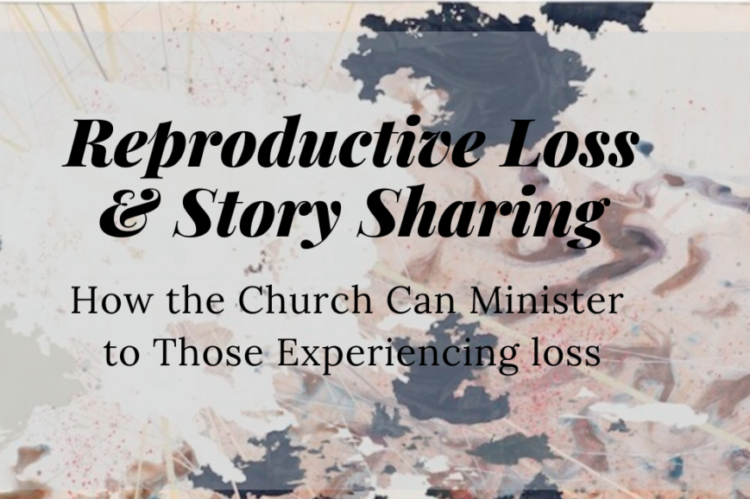


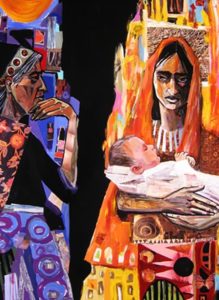
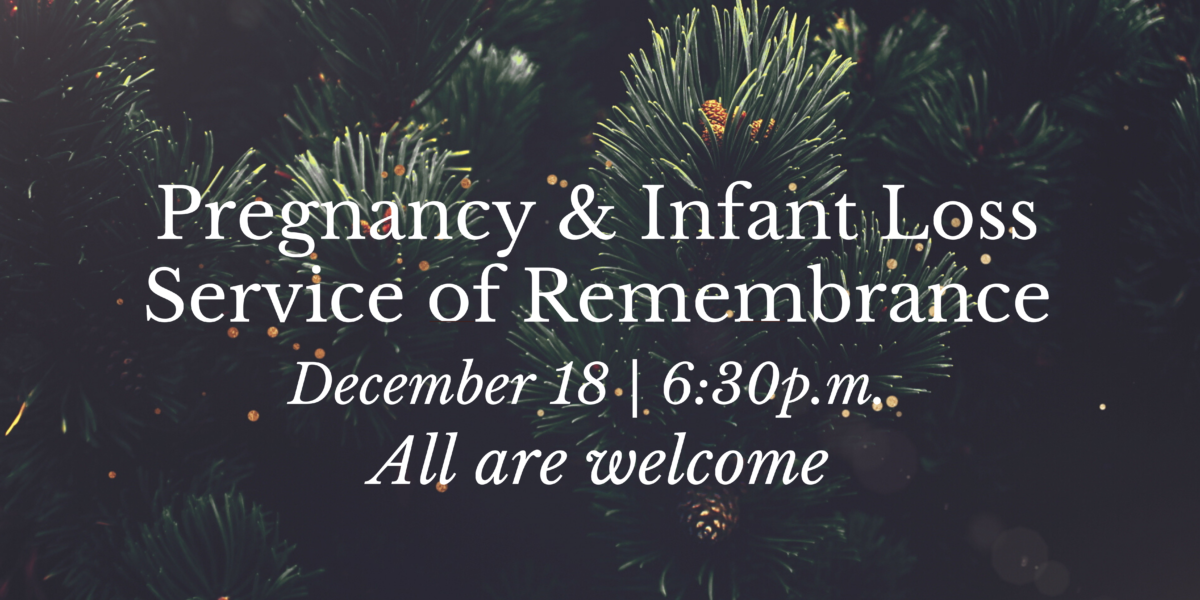
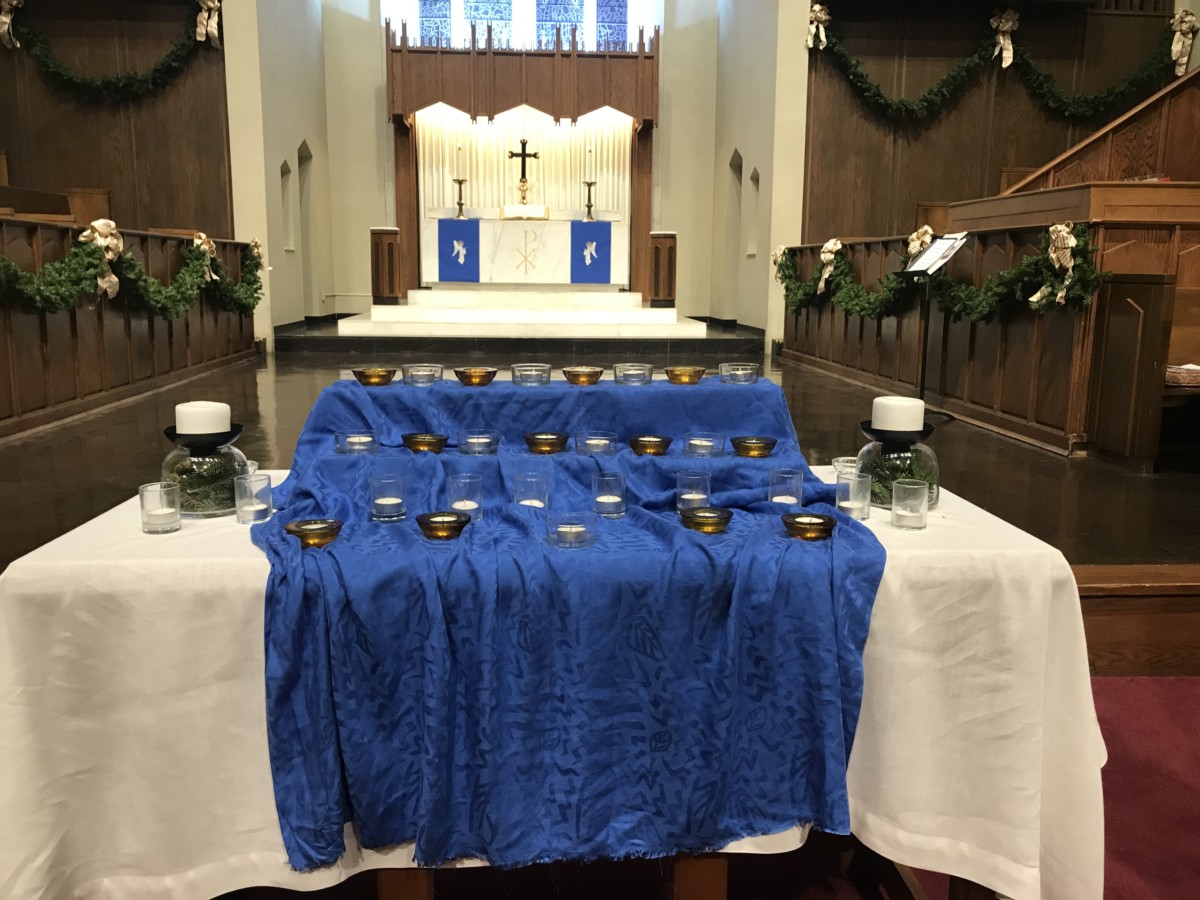

Anna Kate,
Well done. You do a wonderful job addressing a very personal and difficult experience of so many in the church. You raise important and practical ways the church can support women (and men) who experience reproductive loss or infertility. Thank you for these resources as well as a great service for pastors to consider offering for people in their communities. I am thankful for your leadership and for having been on this journey with you as we will soon be Doctors. May God bless you and your ministry with all who are in this “secret group.”
Grace and peace,
Eric Sanford